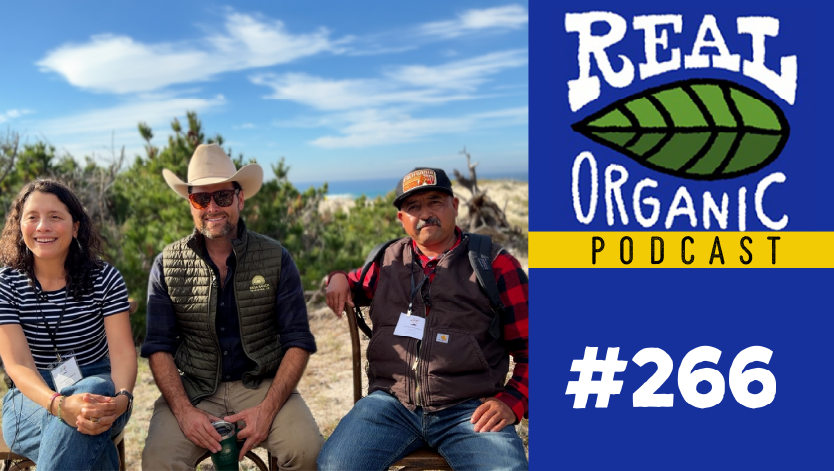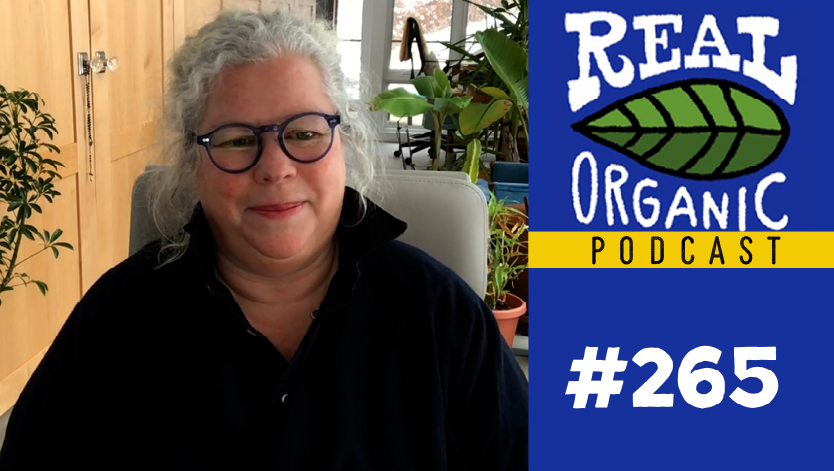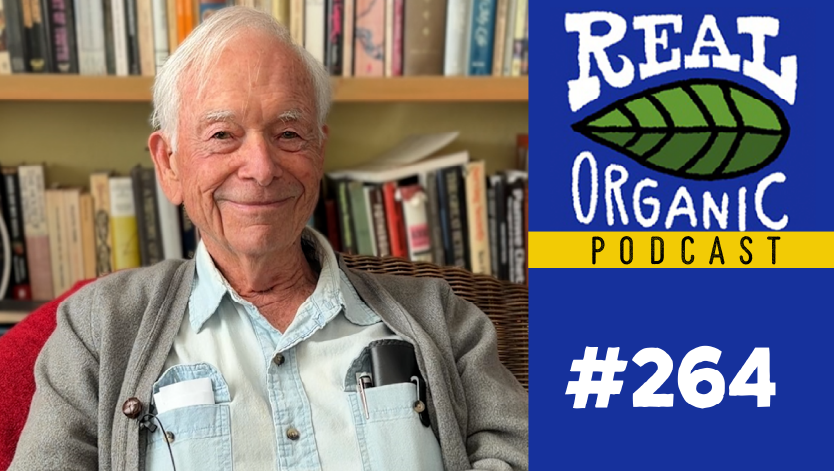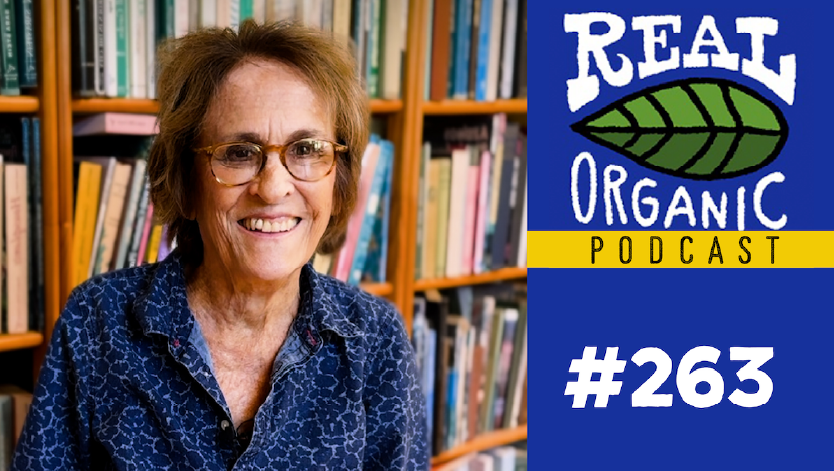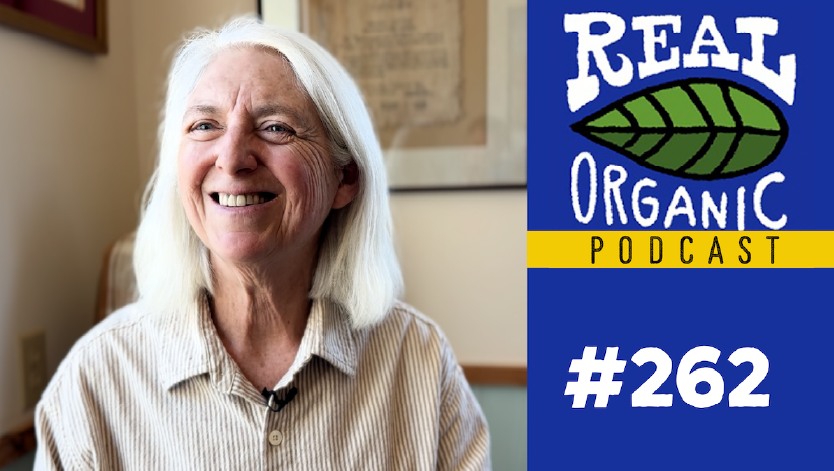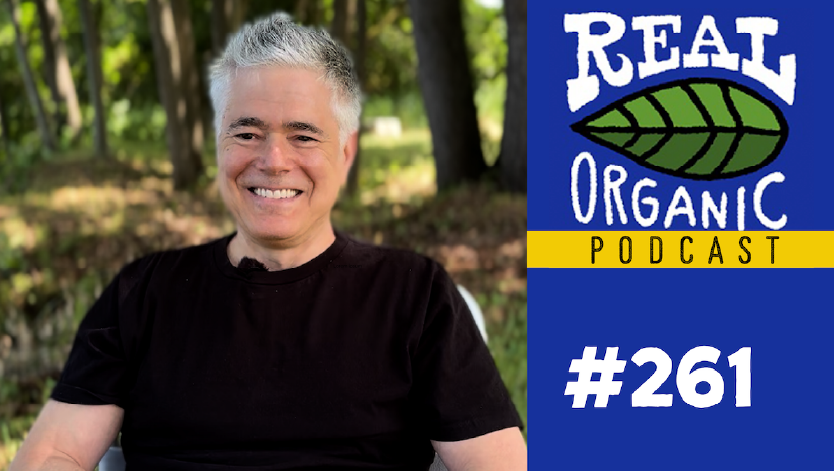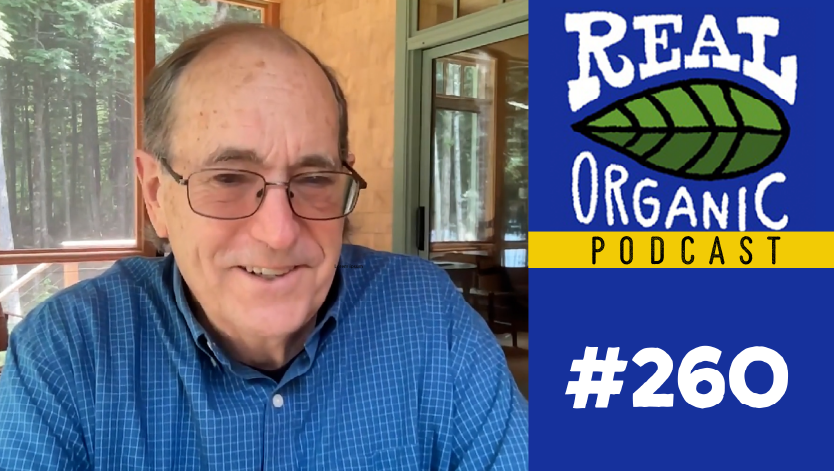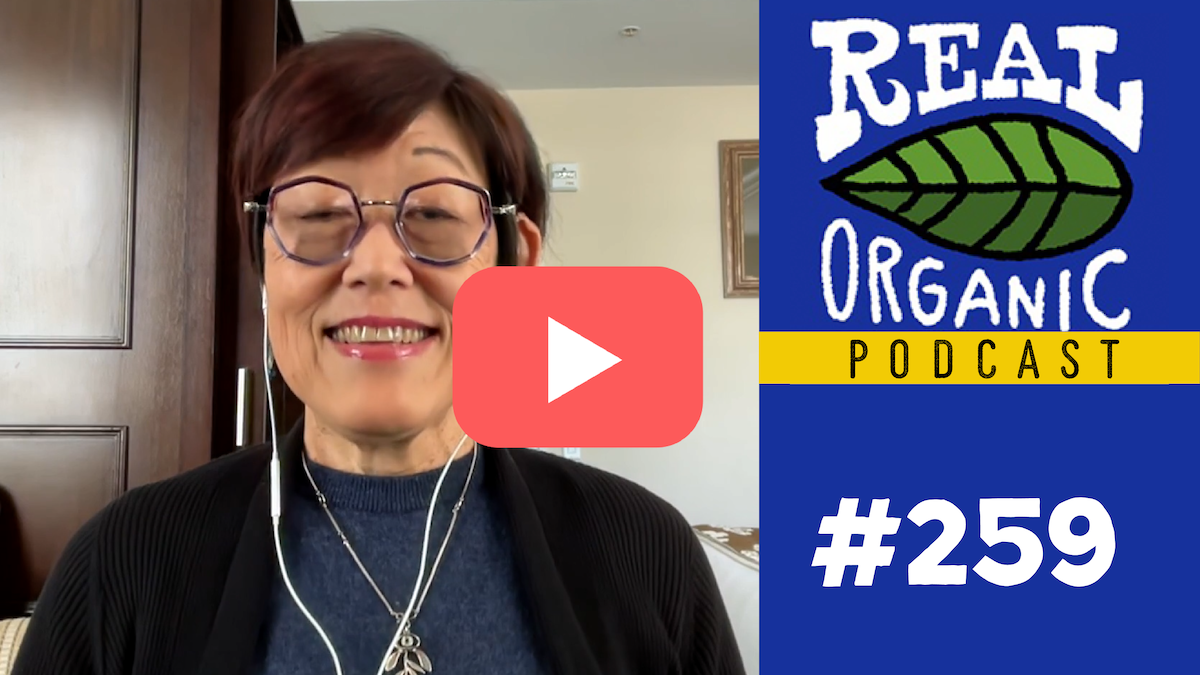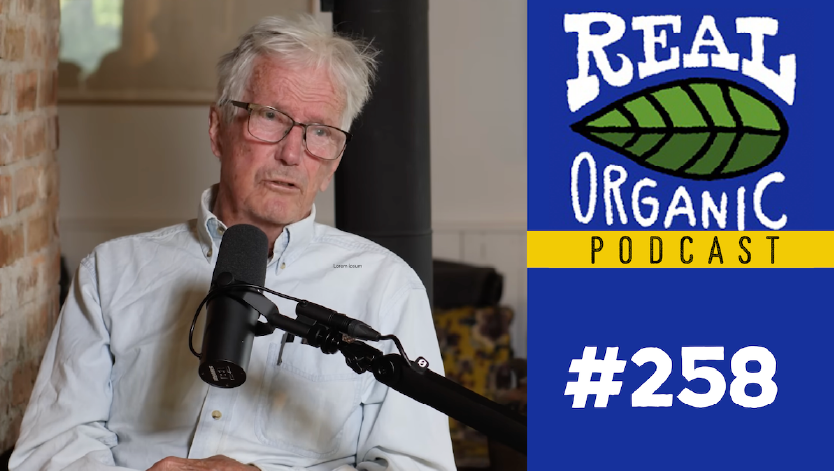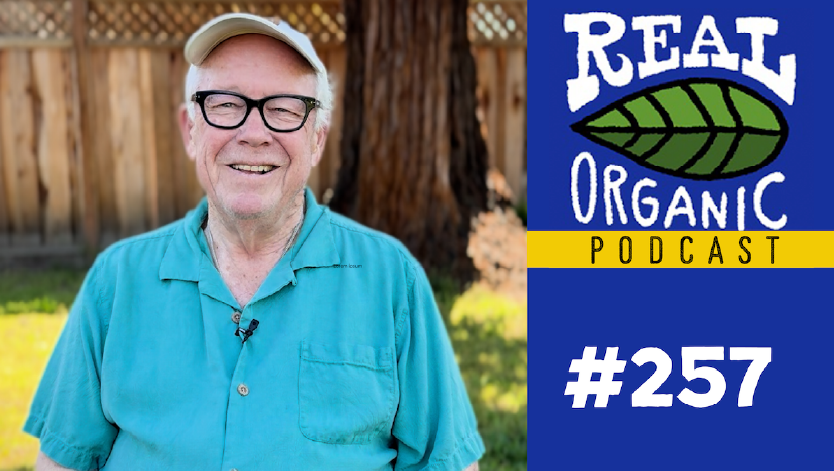Episode #029
John Ikerd, Part Two: Scaling Organic Farms to Fit Nature and Communities
Welcome! You can subscribe and download episodes of our show through your favorite podcast app.
You can also subscribe to receive the video version of each episode on our YouTube channel.
Our John Ikerd interview has been edited and condensed for clarity.
John Ikerd: The basic problem of agriculture in this country is not increased productivity. We don’t need to feed the rest of the world. We need to help the rest of the world feed itself. We need to create a sustainable agriculture that will produce good food for our people. Good, healthful food. And we need to focus on making sure that everybody here is well fed. We were at, before we came into the pandemic crisis – and I haven’t seen any hunger statistics since then – about 11% of all the people in this country were classified as being food insecure and about 14% of the children in this country, about one out of every seven children in this country, was classified as living in a food insecure home. All of the industrial agriculture didn’t feed the hungry people and that was the main motivation for me. We were going to make good food affordable for everybody. It didn’t happen and it’ll never happen in a market economy. You know, we’re taking 40% of our corn crop, if we quit making ethanol for a year out here, we could take care of the loss in our corn crop in Iowa this year pretty easily. We’re feeding 40% of our corn crop to our cars, not to hungry people here or anywhere else.
Linley Dixon: Welcome to the Real Organic Podcast. I’m Linley Dixon, co-director of the Real Organic Project. We’re a grassroots farmer led movement with an add on organic food label that distinguishes soil grown crops and pasture raised livestock. You just heard from agricultural economist and a personal hero of mine, John Ikerd. He was our guest last week when we shared the first part of this interview.John has so much to share about the benefits of small farms to rural communities and the real costs associated with so-called “efficient” industrial farming. Before we hear more from this timely conversation with John in light of Horizon’s recent termination of contracts with all organic dairy farmers in the states of Maine, Vermont, New Hampshire and Eastern New York. I want to remind you that you are invited to visit realorganicsymposium.org, where you can watch sessions from last January’s Symposium that feature the guests you hear in our podcast interviews, along with many real organic farmers across the country. Our five sessions cover soil, health, climate and agriculture, nutrition policy, and how we can work together to reclaim the organic movement from the corporate interests who are working to redefine it. Now let’s get back to my important interview with agricultural economist, John Ikerd.
John, I want to touch on organic systems a little bit because I read an article that you wrote about just the creation. The creation of standards is kind of a race to the bottom. And one thing that you also wrote, and I wrote it down – ” if organic farming simply means farming without synthetic chemicals than organic farming, isn’t sustainable.” Right? And you’ve pointed out that past civilizations completely failed when they were not using synthetic chemicals. So. I’m wondering, what’s your definition of organic or organic farming if it’s not the lack of synthetic chemicals?
John Ikerd: Well, organic farming to me is kind of what I’ve been talking about here. It starts with the realization I call it, you could call it an assumption, but I call it a realization, that the farm, the farmer, the soil, the plants, and the animals are all part of this same sort of living organic whole. And then you focus on how can we tip that ecological balance so that we’re not just hunters and gatherers. Most things in nature are not just simply hunters and gathers, but how can we tip that ecological balance of nature so that we can meet the needs of people, the real needs of people for wholesome healthful food. And meet the needs of all the people, at least with the basic needs. How can we do that? And still function within those natural bounds, that nature has established for us here. And still function within those social bounds, that nature established through the essentials for healthy relationships among people within society.
And it’s always trying to explore that. And the reason that organic standards was a violation of that – and I wrote this piece, I don’t know, back in the late nineties, early two thousands – is because for the industrial system, it’s specialization. But you have to standardize that system. You have to make it all work pretty much alike, which is difficult to do in agriculture, because nature is inherently diverse. Each place, each field, each farm is different. People are diverse. Each farmer, each family is – I talk about family farmers, those are different. And so if you’re going to work within – each community’s different – if you’re going to move toward real organic farming, and you’ve got to say, “what you’re doing here has to fit this place.” It has to fit this farm, this farmer, this community. It has to be in harmony with nature. It has to be managed as an organic regenerative, resilient, resourceful living system, but it has to recognize that it’s functioning within this larger ecological and social whole of which it’s a part. And to me, that’s the reason industrial will never work. Industrial is in conflict with that because you have to be able to do a large amount of the same thing to achieve the economies of scale and efficiency. And if you take away that ability, then the industrial model can’t be economically competitive. But you’ve got to get through the process in moving toward this real kind of organic system that recognizes the place of farms and farmers and plants and animals and people within the larger whole of nature.
Linley Dixon: Is there a line for you even if you’re doing cover cropping, soil health, is there a line where it’s just, it’s just too big? You know, when is scale kind of maybe not fitting into this vision?
John Ikerd: I’ve argued consistently for a long time among very few of us that do this, that size does matter and size does matter because there’s a limit to how much you can manage when you’re managing a highly complex system. When you’re trying to understand the nature of that living system well enough, so that you can function in harmony with it rather than in conflict with it, and try to work with it rather than dominate it, there’s a limit to your span of attention. Your span of knowledge, of the place. You know, when Wendell Berry talks about you have to love the land, that’s what he’s talking about. You have to know it well enough to love it. Anything you’re going to love, you’ve got to know it well enough to distinguish it from everything else, whether it’s a person or whatever it is. And there’s just a limit to how much land you can love.
And it’s the same way when you think about producing food, where people within communities and healthy communities, there’s going to be a limit to that market that you can have. You can have some idea of whether or not what you’re producing is really meeting the needs of those particular people. There has to be a sense of personal connectedness, I think within local food system. And there’s a limit to how many people you can really love. And so the farms have to be appropriately scaled to how much you can really understand. Now, if you go out west or someplace like that, where you’re in a less diverse ecosystem, it’s a less diverse climate, it may be very harsh or whatever, then you can get your head around more land out there. And you could have a pretty good sized operation or different kinds of farming operations that have less complexity.
You could go to a higher level in terms of size, because it’s the complexity of understanding and working with the nature of that system, that ought to limit the size of it. So size does matter. It has to be the right size to fit nature and to fit where you fit within a community or within a society. You know, if you’re going to be in a community of people, for example, and you’re going to have an organic regenerative farm, but you’re going to drive all the other farmers out of business and there’s not going to be any young people that can make a living in that community because you’re taking all the resources, that’s not sustainable. That’s not organic, that’s not responsible. So, you know, and I’ve written on other occasions about the soul of organic, but the early pioneers, they knew this. Lady [Eve] Balfour was one that I quote quite a bit.
She said “You can’t take organic farming and turn it into a set of rules and inputs and things like that.” She says that organic is “in the outlook, the philosophy of the farmer.” And that’s what we’re talking about here. You know, if you standardize, you try to standardize something, then you’re going compromise all of this. And the other thing is you talked about the absolute size. There are some people, and you can name a few, and I could name a few, some good friends and some very, very good, I would argue sustainable farmers that can manage pretty sizable operations. And they do it in a socially responsible way, providing jobs for people taking care of the land and various things, but that operation is consistent with their unique capacity. You can’t just bring in another person and say, “well, you can do that too.” There might be other people that can do that, but I’m saying most of us, normal human beings, there’s a limit to how big a farm we could manage and manage it sustainably. And so that’s what sets the limits. I wouldn’t set a particular size. It depends on the complexity and the extent to which you’re really serious about wanting to accommodate the nature of the place and with respect to, you know, that nature of the ecosystem, but also the nature of the social system.
Linley Dixon: And I struggle because, you know, I’m in Colorado and we can’t get coffee, for example, or rice, or, you know, whatever’s missing. And so how do we connect the eaters that want good food with the farmers that are farming?
John Ikerd: I think that’s a good question. And it’s about transforming the system. Again, I talked earlier about how we tend to get locked in on the same, “well, the system’s basically set.” We can’t change that, but we can change the overall system. So I would say what I’ve been promoting kind of local food systems, local farms, and I’ve put proposals out to have community food utilities, where you’d have a local public utility that would do it. So there’s obviously a limit to what variety of products and things you’re talking about that you can produce within a community where people can know each other. But the thing is, is if you continue with other communities that share those same basic values, that they’re working to keep their farms in their community in harmony with their particular place, and you’re working to keep your farms in your community in harmony with your particular place, then you can exchange products between those markets.
And they’re both produced with the same integrity. And so you can connect with people in south America or wherever that are producing coffee. And if you’ve got a community of people there that share your same basic values, then you’re helping to make their operations sustainable by connecting with them, and they’re helping to make your operation sustainable by getting what you’re doing. So it’s not a matter of self-sufficiency. And a lot of people tend to think of that, the back to the land people and so on, and other people talk about it, but it’s not a matter of self-sufficiency, it’s a matter of what I would call food sovereignty. There’s a whole global food sovereignty movement. It’s when you establish a situation in which you can choose the other specific communities and people that you deal with, so that you can say, “we will deal with people that share our basic ethical and social values about how we ought to treat the land, how we ought to treat each other.”
We can build regional networks of systems like that, which are all tied together by people that know each other, somebody from this community knows this other person and can vouch for them personally. The personal connection with another personal connection, with another – it’s all connected. This whole system is all connected through personal relationships. Even though everybody in every community doesn’t know everybody in the other community, they know the people that are representing them when they go to other places to get other food and things of that nature. So, we recreate the whole food system, just like we did in the early 1900s. And we do it in a way that creates a sustainable future. For everybody. We have a healthy, happy population. What’s wrong with being idealistic?
Linley Dixon: No, I like this. And it’s what we’re trying to do. And we’re communicating with, there’s lots of groups out there that are looking at food systems. There’s a certification agency that started in Germany called Naturaland. And they are connecting 40,000 farmers around the world just because they’ve been around for 40 years now. But here’s, here’s a zinger for you. And I don’t know if anybody can really answer this, but I bet you can, if anybody can. So, you know, you’ve even mentioned during this talk, several words from “sustainability,” and then we kind of moved on to all the other words, “regenerative.” Once we get a word that has full credibility, a grassroots movement, the industry comes in and, you know, there’s, there’s really big industrial CAFOs, hydroponic operations that call themselves family farms, right? So every word. Monsanto, it went sustainable. Now it’s.. Monsanto’s is regenerative!? How do we connect when the industry is better at marketing us, then us?
John Ikerd: It’s because they’re doing mass marketing and what I’m talking about, we have to have person to person kind of connection and person to person marketing. And I think that’s, that’s not out of the realm of possibility at all. Cause I think more and more people are catching onto greenwashing and advertising and, you know, just out and out lies that people tell. And there’s less and less confidence in that. So I think it has to grow through personal relationships with people, and personal connections. Back when we argued about sustainability, I don’t know if “sustainability” is the ultimate word, but to me, what was important about sustainability is just from a common sense standpoint is, is you can look at something and say, “it’s not sustainable.” And how often do you hear that? Nowadays, this is not sustainable, that is not sustainable. We may argue about what is sustainable, but it’s pretty clear that we agree on a lot of things that are not sustainable. And I think that’s the importance of that particular word, but whatever word it is, just because it’s been co-opted doesn’t mean that it’s useless. Andi use the word love. Do you know how many different definitions there are of love? I can’t think of any word that’s been more, co-opted and abused.
Linley Dixon: Even with food! Some people say, you know, in the ingredients they’ll add “love” and some of them are for real, you know, maybe they’re small companies. But I’ve seen some really big ones, like Coca Cola maybe, or who knows some, some big ones have done that. And I’m like, yeah, right.
John Ikerd: So have all of this abuse and misuse and everything else of love, but do we abandon it? Is it a useless concept? What if you really got down and talked to people sincerely and, you know, they would come around to this, like, what is life about? It’s about loving and being loved. I define love as a belief in the inherent goodness of something. We all need somebody in our lives to believe that we’re inherently good, that isn’t going to judge us for every single thing we do. Isn’t going to develop a standard for love that we have to meet or whatever. It’s based on this, this kind of faith in the goodness of it. And I think what we’re talking about here is there has to be a faith in the inherent goodness of nature, in the inherent goodness of the reality that we’re in.
We basically have to love the land. As, as Wendell Berry said, “we have to love other people,” not in the sense of the romantic love or the way that, you know used in movies and on TV shows and stuff like that, but loving the belief of the inherent goodness. And if we can bring that goodness out, if we can allow whatever is there within nature, within other people, if we can somehow bring that goodness out and that they can bring the goodness out in the us, then you can abuse love all you want to. But I think down deep, most of us know that that’s what it’s about. People ask me, “how could you ever get people to change to what you were talking about here?” I say, all you have to do is get people to think about their own personal lives.
Meeting your basic material needs, tangible needs is important. And that’s what the economy is about. Food, clothing, shelter, a place to live and sleep, things like this. You know, transportation, all of that’s important, but once those basic needs are met in particular – and even before that, whether your life is better or not is not about whether you have more money to buy more stuff and more things, and take more vacations, it’s about whether you have meaningful relationships in your life. Whether there’s other people that you care about and other people that care about you. And then the ultimate one is where you have some sense of purpose and meaning alive. Is what you’re doing worthwhile? Does it, does it make a difference? And, and we know individually without those relationships and without a sense of purpose and meaning in life, it doesn’t matter how much money we have or how big our farm is, or how much you and we have or anything else. And we simply need to start creating communities and shaping our government and running our farms and running our businesses based on those basic human principles that we know in our hearts are right and true. And, you know, I’ve said that all we really have to do to create a sustainable food system, a real organic farming system is we just have to become fully human. Because the goodness is there, but we’ve just been suppressing it with this pursuit of something that hasn’t really improved our lives.
Linley Dixon: Yeah. And you’ve said that this is spreading. That there is a rural Renaissance. Do you believe that we truly can… You know, the words “we can feed the world” was used for industrial farming, but do you feel that small farms can feed us in a way that’s not going to set us backward? You know we’re far from being the Luddites that we’re accused of being, right? The science is grossly underfunded for organic farming, but it’s really coming along. I look at some of the pheromone traps and the bio-controls, you know – this is technologically advanced, but it’s using the ecological system. So do you think we can feed the world? Small farms?
John Ikerd: Yeah. What a lot of people don’t recognize – and you can go to any of the UN reports and it’s there – that 70 to 80% of the people in the world are not fed by industrial agriculture. They’re fed by small family farms, most of which we would call subsistence farms. So they’re meeting their needs within their communities, all over the world today. And then also within the international community, you know, we hear agroecology is a big, big term in the international community. And food sovereignty is a big term in the international community, but they’ve done research in Africa and Aouth America, and I don’t know where. All around the country, there’s all sorts of research projects that have been done that we could double or triple the yields on those small farms, right? Without anything remotely comparable to industrial agriculture. Probably similar to what we had here in the early 1900s, when we had the land grant universities, and scientists were learning how to test soil, and what was in the soils and things of that nature, and learning how to rotate crops.
You know, there used to be a program called Clover and Prosperity to get farmers, to bring legumess into the rotations and things of that nature. So ballast farming and I talked about before. That’s the kind of thing all you would need. So that, let’s say 70%, if they doubled their input, you know, I’m not saying they’re totally fully fed, that’s 140% of the people could be fed at the level that they are now. And so we can, you know. I think we can go beyond that. Now, the thing a lot of people don’t realize, they say, “well, everybody’s got to produce yields like we do in the United States or Europe” or places like that. Well, as you know, in organic, again, it takes particular organic farmers that have been on the farm for a long time.
They can be competitive in terms of the yields of their crops. They can’t produce the 400 bushel per acre crops unless they do something totally non-organic – may do it without conventional inputs. But you know, again, there’s certain kinds of strengths, but we can be competitive. But the basic problem of agriculture in this country is not increased productivity. We don’t need to feed the rest of the world. We need to help the rest of the world feed itself. We need to create a sustainable agriculture that will produce good food for our people. Good, healthful food. And we need to focus on making sure that everybody here is well fed. We were at, before we came into the pandemic crisis, and I haven’t seen any hunger statistics since then, about 11% of all the people in this country were classified as being food and secure.
And about 14% of the children in this country, about one out of every seven children in this country, was classified as living in a food insecure home. All of the industrial agriculture didn’t feed the hungry people. That was the main motivation for me. We were going to make good food affordable for everybody. It didn’t happen and it’ll never happened in a market economy. You know, we’re taking 40% of our corn crop – if we quit making ethanol for a year out here, we could take care of the loss in our corn crop in Iowa this year pretty easily. We’re feeding 40% of our corn crop to our cars, not to hungry people here or anywhere else. And we’re making ethanol, you know, we’re turning it into ethanol. If you weren’t wasting 30 to 40% of the food in this country, throwing it away because we let it sit around the refrigerator too long, or we don’t like to eat things that have a little hole in it somewhere.
You know, production is not a problem. And when we talk about feeding the world, we’re not exporting our crops to the hungriest countries in the world because they don’t have any money. We’re exporting to those growing economies, where there was an increasing affluent middle-class primarily that wants more feed grains to feed the animals. They want more animal products. So we’re feeding the affluent of China and India and places like that. We’re not feeding hungry people. And we never will when you depend on the economy. So we have to look at other means of meeting the needs of hungry people. And that’s what I was talking about witn the idea of community food utilities, where you separate this commitment to making sure that everybody in your community is food secure, and you don’t depend on the market to do it.
You get with local farmers and local people who are committed to making it happen. 85% of what we spend on food is not for the food; it’s for processing, advertising, packaging. We take away that part of it. We help people learn to prepare the food. We make sure that they have time and have the ability to prepare food for themselves. They prepare it with their kids like I did. All of us kids had to with my mother growing up. So you know how to cook. And again, you’re contributing something to the family. You can build strong families. And if we took responsibility within our local community, and if you had a public food utility to protect you from the market. So somebody couldn’t come in and say, well, I can give you a bunch of cheap junk. You know, if you want to join the community food utility, you could have people in the community that is still eating junk food.
But if you create a public utility where people can join that, rather than the government payments going in there, they come into the utility. You know, I’m not saying that’s the solution. I’m working with a group out in Denver called Metro, and we’re exploring this idea. I have some meetings set up with them. You know what? We need to recognize that this whole propaganda about “we got to feed the world. We got to feed hungry people.” Food prices in this country have gone up faster than inflation for the past 20 years. We bought food prices down between the seventies and nineties, the early years of industrial relations. After the corporations got hold of the food system in the late nineties food prices going up faster than overall inflation.
Linley Dixon: The farmer’s not seeing that. I think our prices have been flat.
John Ikerd: They’re just taking a bigger share out of it. They’re putting more into processing, advertising, things of that nature, but they make a profit off all of that. Their profits have just exploded and they say, “we’re going to feed the world.” You’re not even feeding Americans. You’re not even feeding hungry people here, and you’re not producing affordable food, even for the rest of us. And the food’s killing us. Everywhere around the world that we export this industrial food system you see the same problems we’re having here. You have an increase in obesity and heart disease, high blood pressure, and a whole range of things. And these other countries, a lot of these other countries don’t want our industrial agriculture, but we’re forcing it upon them. The big corporations are forcing it on them. Our government’s forcing it upon them. You know, we’ve just got to wake up and do something different.
Linley Dixon: Could you talk a little bit since you’re on the board of cornucopia, what’s happened with Aurora dairy?
John Ikerd: Well, I I’m on an advisory committee. I’m not actually on the board, so I don’t, I really don’t know. They haven’t really filled in the advisory committee much since they had the transition in leadership.
Linley Dixon: I’ve just heard that they’re expanding right now and that they’ve got a new processing facility in Missouri. Have you heard about that? No. Okay. And so I thought of you because I’m thinking, you know, they’re doing exactly what John said would happen right now. There’s a glut of organic milk, prices have never been lower and Aurora is expanding, right?
John Ikerd: Right. No, I hadn’t, I hadn’t picked up on that. I hadn’t picked up in this. Maybe I had heard there was already one close to Columbia, Missouri. Are they expanding on that one or is it somewhere else?
Linley Dixon: I’m not sure if that’s the one I’m thinking of it might be.
Well, you’ve at least given us a, a bit of hope and thank you for answering a lot of the demons that keep me up at night. You do have a beautiful vision for the future of, of what could be. So I appreciate that.
John Ikerd: Well, I tell people “what I say is my truth. It’s what I believe to be true.” And I think the reason I’m so bold about saying these things is that it comes from the fact that I don’t know everything, and I’m not smart enough to figure all this out, but we need to be sharing these ideas because there’s a lot of other people out here that are working on this. And as I see it, like I was saying before, at my age in particular, I think at each stage in life there’s still some purpose to life. When there’s no longer any we might as well just go ahead and die. So what I try to do is think, “okay, what is my purpose? How can I use the experience I’ve had?” And really the breadth of experiences that I’ve had. I’ve been on hundreds of farms across the country. I’ve slept on probably a hundred farms, different farms, going someplace, you know, to a conference and they put you up on a farm and all of that.
Linley Dixon: I often end up in the hay barn, which is actually a good night’s sleep.
John Ikerd: All I’m doing is, is just doing like here today, doing what I think I need to do in my little piece of the world. And I have no illusion that the world is going to change because of me. But I think the world can change. If everybody tries to figure out what is it that you can do at this point in time that would help make the world better. That would bring out the goodness in other people. And it would bring out the goodness that I think is intended of humanity. And I think to the extent that we can contribute to that, if we can see how we can contribute to that, we will have fulfilled our purpose and we will live the best life we possibly could have lived.
Linley Dixon: Yeah. These conversations are important. Thank you for taking the time to have it with me.
John Ikerd: Glad to do it.
Linley Dixon: Thank you for listening to the Real Organic Podcast. We hope that you will follow and subscribe. Tell your friends and leave us a rating and review on Apple Podcasts or wherever you found us. A video version of this interview, as well as the full transcript with links related to our conversation can be found a realorganicproject.org/episode29. Please join us next time for an interview with David Grinspoon, NASA astrobiologist and author of Earth In Human Hands, Science Friday’s 2016 Book of the Year. To find a Real Organic Farm near you, visit it realorganicproject.org/farms


